How Often Should Commercial HVAC Be Serviced?
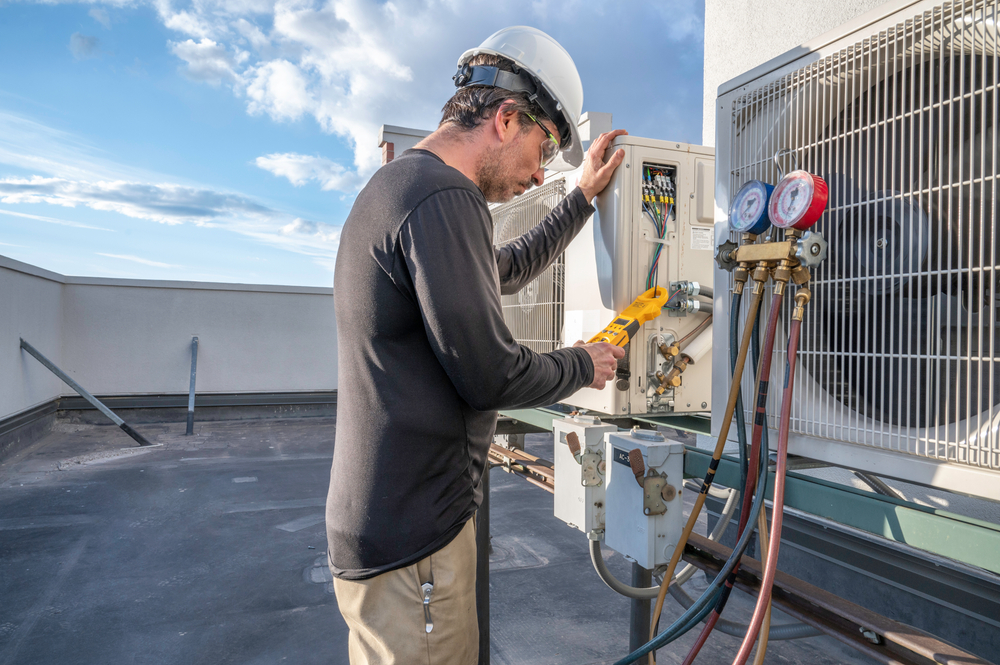
You probably don’t think about your business’s HVAC system every day. It’s easy to take it for granted—until it falters. To ensure your commercial HVAC system operates at its best, how often should it be serviced?
From energy efficiency to cost savings and environmental impact, we’ll share what goes into preventative care for commercial HVAC systems.
How Often Should Commercial HVAC Be Maintained?
A general guideline is to perform routine maintenance at least twice a year.
However, the frequency of maintenance for commercial HVAC systems can vary depending on factors such as the type of system, the size of the facility, the local climate, and the business’s specific needs.
Here is a suggested maintenance schedule.
Spring and Early Summer:
- Check and replace air filters.
- Inspect and clean evaporator and condenser coils.
- Inspect and clean drain pans and condensate lines.
- Check refrigerant levels.
- Inspect ductwork for leaks.
- Test thermostat operation.
Fall and Early Winter:
- Check and replace air filters.
- Inspect and lubricate fan motors and other moving parts.
- Inspect and clean burners (for heating systems).
- Check and tighten electrical connections.
- Test the heating system.
- Inspect the overall system for any signs of wear or damage.
Additionally, some components may require more frequent attention. For example, air filters may need to be checked and replaced more often, especially in environments with high dust or pollutant levels.
Another consideration is how hard your HVAC system works. Are there large, wide-open spaces that utilize exhaust fans? Do you need a clean room for precision work? Are there rooms that must be kept at precise temperatures? What about rooms that get too hot or too cold due to your industrial processes? You may need quarterly maintenance or checks for special conditions.
Related Post: How Facility Management Services Lower Your Energy Bill
These are general guidelines, and specific HVAC systems may have their own recommended maintenance schedules provided by the manufacturer. Regular maintenance helps ensure the efficient operation of the HVAC system, improves energy efficiency, prolongs equipment life, and reduces the risk of unexpected breakdowns at the most inconvenient times. Establishing a routine maintenance plan and working with a qualified team can help keep your system in optimal condition.
How Long Do Commercial HVAC Systems Last?
The lifespan of a commercial HVAC system can vary depending on the type of system, its usage, the quality of installation, and the level of maintenance it receives. Commercial HVAC systems can last anywhere from 15 to 25 years on average.
Here are some factors that can influence the lifespan of a commercial HVAC system.
Type of system: Different types of HVAC systems have different lifespans. For example, rooftop packaged units, which are common in commercial settings, typically have a lifespan of 15 to 20 years.
Maintenance: Regular and proper maintenance is crucial for extending the lifespan of an HVAC system. Routine inspections, cleaning, and timely repairs can prevent breakdowns and ensure the system operates efficiently.
Usage and load: The frequency and intensity of HVAC system usage impact its lifespan. Systems that constantly run or experience extreme temperature variations may wear out more quickly.
Installation quality: A properly installed HVAC system is likely to have a longer lifespan. Poor installation can lead to issues such as improper airflow, which can strain the system and reduce efficiency.
Technological advances: Advancements in HVAC technology may lead to more efficient and durable systems. Older systems may become outdated and less energy-efficient over time.
Environmental conditions: The climate conditions in which the HVAC system operates can affect its lifespan. For example, systems in coastal areas may be exposed to salt air, which can accelerate corrosion.
Manufacturer and model: The equipment’s quality and the manufacturer’s reputation can influence the system’s lifespan. High-quality systems from reputable manufacturers may have a longer operational life.
Businesses need to monitor the performance of their HVAC systems, conduct regular inspections, and follow a proactive maintenance plan to maximize the lifespan of the equipment. There are high-tech ways to do this with IoT devices and sensors that deliver data wirelessly to a facility management software suite.
Related Post: 6 Signs It’s Time to Replace Your Commercial HVAC System
When a system reaches the end of its lifespan or experiences frequent issues, replacing it with a newer, more efficient model may be more cost-effective. Regular consultations with HVAC professionals can help businesses decide when to repair or replace their commercial HVAC systems.
Is HVAC Preventative Maintenance worth it?
Yes, HVAC preventative maintenance is worth it. Regular maintenance provides several benefits that can save you money in the long run and ensure the optimal performance of your HVAC system.
Related Post: 4 Phases of Planned HVAC Maintenance Explained
Here are some key reasons why preventative maintenance is worthwhile.
- Energy efficiency: Regular maintenance ensures your HVAC system operates at peak efficiency. Clean coils, well-lubricated components, electrical switches and capacitors working well, and proper airflow all contribute to reduced energy consumption.
- Extended equipment lifespan: Routine maintenance helps identify and address potential issues before they become significant problems. This proactive approach can extend the lifespan of your HVAC equipment.
- Prevention of costly repairs: Small issues, if left unaddressed, can escalate into more extensive and more expensive problems. Preventative maintenance allows for the early detection and correction of issues.
- Improved indoor air quality: Regular cleaning and maintenance of HVAC components, such as filters and coils, improve indoor air quality. This is particularly important for commercial spaces where air quality can impact the health and productivity of occupants.
- Consistent comfort: A well-maintained HVAC system is better equipped to provide consistent heating or cooling throughout your facility. This is crucial for occupant comfort and can impact employee productivity and customer satisfaction.
- Compliance with warranty requirements: Many HVAC manufacturers require regular maintenance to maintain the warranty on their equipment. Skipping maintenance may void the warranty, leaving you responsible for repair or replacement costs.
- Reduced downtime: Scheduled maintenance allows for planned downtime when the system can be serviced without disrupting your business operations.
- Compliance with regulations: In some jurisdictions, some rules and standards require regular maintenance of HVAC systems to ensure energy efficiency and environmental compliance.
Contact Omnia360 Facility Solutions for HVAC Maintenance
While there is a cost associated with preventative maintenance, the long-term savings and benefits outweigh the initial investment. Omnia360 provides around-the-clock, comprehensive, preventative maintenance services that work with your in-house team. Contact us at (833) 360-6642.
HVAC Commercial Maintenance for Restaurants
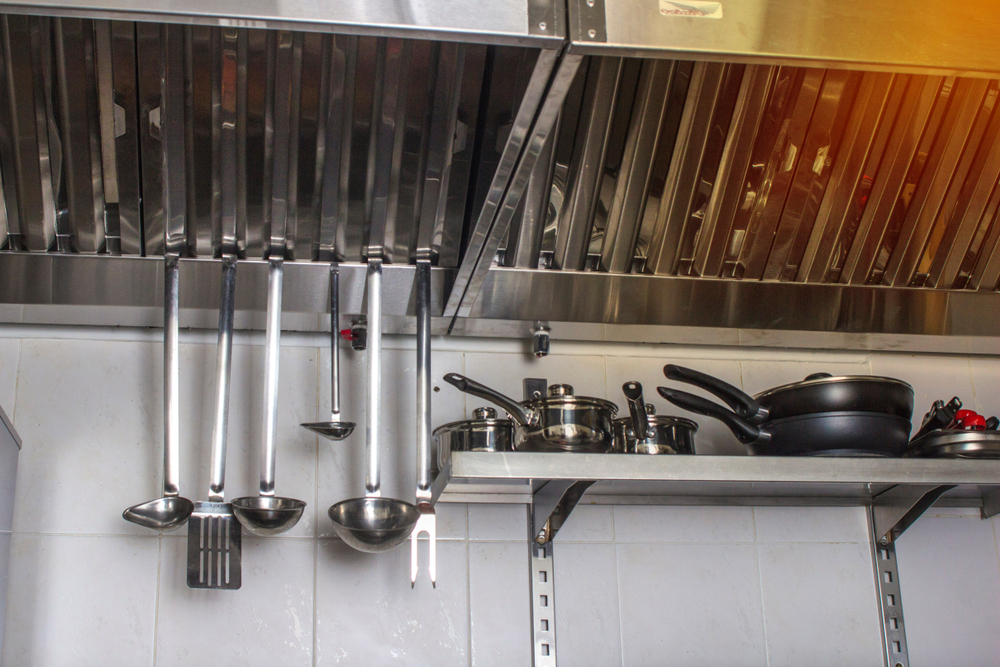
Anyone who’s worked in a kitchen can vouch for the heat. In a commercial environment especially, it’s necessary for both the safety and comfort of employees and diners to keep a well-maintained HVAC system.
Learn from the experts at Omnia360 how to keep up HVAC maintenance to keep your business running smoothly and your staff comfortable and healthy.
Why Should I Use HVAC Commercial Maintenance Services in My Restaurant?
In food service settings, the restaurant must meet specific HVAC system standards.
In a restaurant, especially, air quality and temperature control are essential. With equipment like ovens and stoves turned on for hours, kitchens can get hot! To keep your kitchen staff comfortable on the job, it’s essential to keep a regular schedule of HVAC maintenance.
Air quality is another critical factor in keeping your kitchen safe. In an environment where smoke can be expected, proper ventilation is necessary.
Keeping the air quality of your restaurant in check is another vital factor in keeping your kitchen standards high. When an air conditioner begins to break down, you might notice increased humidity levels. In turn, this humidity can contribute to mold.
Indoor humidity should be kept as low as possible in a food service environment, and a functioning HVAC system keeps indoor air quality at an acceptable level.
Hard facility management services can be an excellent tool for restaurant owners to keep their businesses running smoothly. “Hard” facility management services refer to maintenance and repair work integrated into the business’s infrastructure.
Related Post: What Are Hard and Soft Facilities Management Services
Regular upkeep of your establishment lowers the risk of replacing entire systems later. It reduces the hassle of booking repair appointments at the last minute or during an emergency.
A Working HVAC Saves Your Business Money
A regularly maintained commercial HVAC system can lead to significant savings!
Keeping an eye on your business’s utility bills is also an excellent way to see if it may be time to replace a poorly-performing HVAC unit. If your bills appear to jump up in cost out of seemingly nowhere, it could be due to the age of the system or damaged components, which use more energy than necessary.
In order to keep your energy costs low, it’s essential to consider consistent HVAC maintenance.
Related Post: 4 Types of Planned HVAC Maintenance Explained
In the long term, an entire HVAC system replacement will save you money and be more energy-efficient.
Looking for HVAC Commercial Maintenance Services in Cincinnati?
If you’re looking for 24/7 comprehensive HVAC, plumbing, and electrical maintenance for your office building, all from a single source, consider partnering with Omnia360 in Cincinnati, Ohio: (833) 360-6642.
Commercial Air Conditioning FAQs
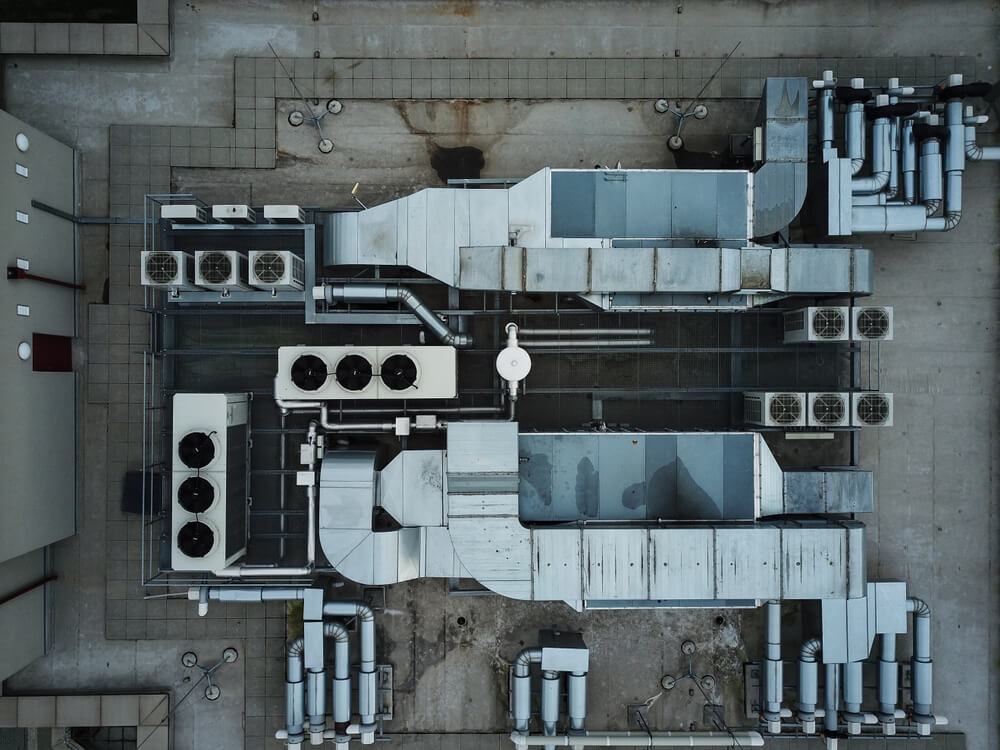
Commercial air conditioning systems see heavy use, day in and day out, year after year. They work hard to keep customers and employees comfortable at your commercial property.
In today’s post, Omnia360 facility solutions, a premier facility management company in Cincinnati, answers frequently asked questions about commercial air conditioning for your business.
What’s the difference between residential and commercial air conditioning units?
Think of a commercial HVAC system as a larger, more complex version of your home’s HVAC unit.
What is a commercial air conditioning system?
Commercial systems have a multitude of packaged units with their own thermostats so that different rooms and floors (zones) can regulate their temps. Due to their size and scope, ventilation is more complex, involving a convoluted network of pipes and drains.
Lastly, the tech is more advanced than a normal HVAC system; most buildings have AC units with economizers that use logic controllers and sensors to push out heat and bring in cool outside air.
What’s the average cost of commercial air conditioning repair?
Due to how robust a commercial HVAC system is, it’s typically more expensive than repairing the AC in your home.
- $75 to $200 depending on the contracting company.
- Parts also vary in complexity, ranging from $2,000 to $3,000.
Should I hire an HVAC company or an FM company for AC service work?
It depends on how much maintenance coverage your building needs.
If it’s more than HVAC: plumbing, janitorial work, or landscaping, then and facility management company will save you thousands of dollars throughout the year.
If it’s just a few one-off repairs to your HVAC system, hiring a commercial AC repair company near you is advisable.
How much money does a commercial HVAC system cost?
Businesses can expect to pay between $7.50 and $10.50 per square foot for AC systems. Market research suggests that commercial costs are expected to rise due to factors like skilled labor shortage and ever-increasing costs for new constructions.
What are the six types of commercial HVAC systems?
-
Single-split system
Single-split system, every indoor unit connects to an exterior unit. Whenever you need more AC, you can just add more units to each room. Ideal for smaller spaces, like coffee shops, corner offices, and similarly sized locations. Not ideal for large offices.
-
Multi-split system
Ductless multi-split systems — unlike single-split systems — connect up to five indoor units to one outdoor unit, giving each room individual temperature control settings. Ideal for large commercial properties, not for smaller office spaces.
-
Heat Pump
The heat pump just works to push and pull air from the interior to the exterior of your building, reversing directions whenever cold or warm air is needed. It’s great for schools and sports facilities but often fails in colder climates, like Cincinnati, Ohio, where temps sink below 40 degrees.
-
VRF or VRV system
Variable refrigerant flow (VRF) or variable refrigerant volume (VRV) consists of a heat pump that uses refrigerant in the heating and cooling lines, with multiple evaporator connections to a single condensing unit.
-
VAV system
Variable air volume (VAV) systems give consistent, comfortable temps by varying airflow levels. It’s perfect for small offices or commercial spaces where parts of a building need to be heated and other parts cooled off. Some VAV systems are in a single unit, but serve multiple areas (zones).
-
CAV system
Constant air volume (CAV) systems provide consistent airflow by adjusting the air supply temperature setting. Perfect for spaces with large areas, few windows, or openings, like showrooms or exhibition halls. Not ideal for buildings with multiple floors requiring multiple heating and cooling zones.
What type of AC is best for commercial use?
Variable refrigerant flow systems are well-fitted for large commercial buildings; they’re easy to control, energy-efficient, and long-lasting.
Multi-zone mini-split systems are the best choices for commercial buildings with multiple offices or rooms, each requiring independent thermostat control.
How long does a commercial AC last?
10 to 15 years. More with preventative maintenance and careful use.
Which AC unit lasts the longest?
Longevity will depend on the manufacturer. Some quality brand names include:
HVAC systems that use a two-stage mechanism (like mini-split systems) tend to last longer because they don’t have frequent “on” and “off” cycles.
Factors that affect your HVAC’s longevity:
- Wear n’ tear.
- Preventative maintenance.
- Incorrect installations lead to premature system failure and minor, repeated breakdowns.
That’s why it’s important that you choose a reputable HVAC contractor with a track record of quality installations.
What size commercial AC do I need for my building?
It depends on the size of the building, average external temperature to building design, orientation, and purpose.
Commercial HVAC systems are measured in tons — British Thermal Units (Btu) and can range between 2 and 30 tons. Generally, it takes 25 Btu to cool 1 square foot.
You’ll need to determine the heating and cooling load required for your commercial property. That requires some math: “How to Perform a Quick Load Calculation.”
Be Warned: Choosing the wrong size negatively affects energy costs, system performance, and how much maintenance is required.
What is the most efficient commercial HVAC system?
Choosing a great HVAC system will depend on factors like building design, air quality, and energy efficiency. Other considerations include your budget, how many rooms or floors your building has, and how long you expect the system to last.
Which AC is the most powerful for my commercial property?
To find the most powerful AC system, check and compare the BTUs and heating/cooling power input (Watts) of each AC product on third-party wholesale websites.
Ask Yourself: Does this unit handle hot summer weather well?
Depending on your business’s location, as well as your building’s age and design, your employees and customers might feel like they’re inside a toaster oven during the summer months. That is, if you don’t buy the right-size AC unit for your space.
The right size will depend on your building’s layout. So if it’s too large or oversized for your small office space, you’ll run up energy costs for nothing. If it’s too small for your two-story building, your unit won’t keep up with the demand.
Commercial HVAC System Repair & Maintenance 24/7 Support
Our facility management services provide you with 24/7 support to maintain all facets of your commercial building, from commercial HVAC repair to plumbing, janitorial cleanup, and landscaping. Schedule your FREE assessment today: 833.360.6642.
6 Signs It’s Time to Replace Your Commercial HVAC System
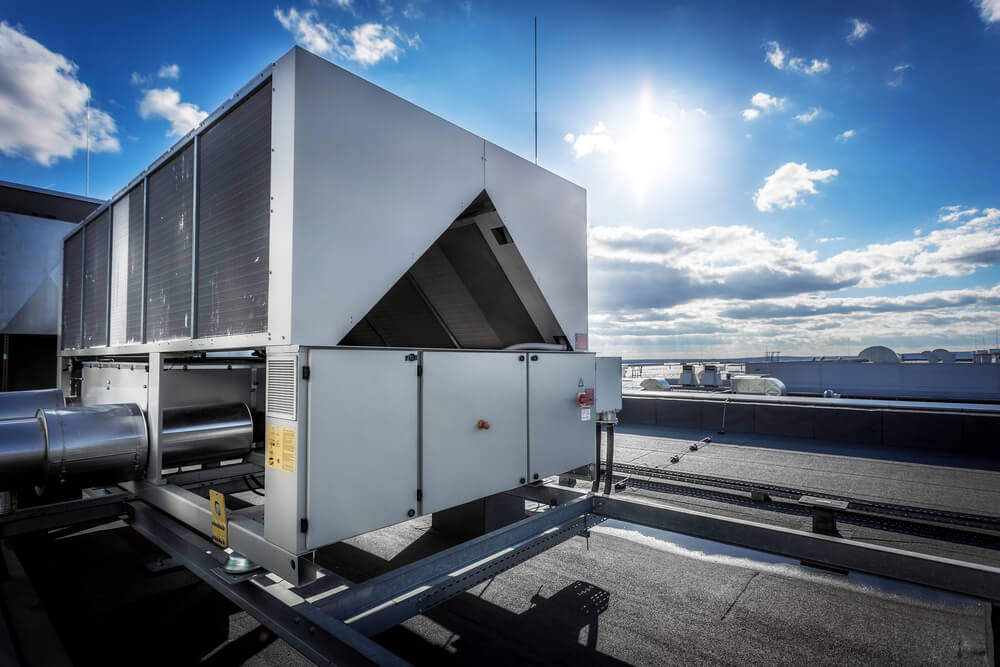
HVAC systems for commercial office buildings are pressured to perform day in and day out, providing cool and warm air for multiple floors and rooms. Over time, they undergo a lot of wear and tear.
That can mean more and more out-of-pocket costs towards HVAC maintenance or repair — pretty expensive. Then again, buying a new commercial HVAC unit is not cheap either.
So, here’s the real question:
How do you know it’s time to replace your commercial HVAC system?
Omnia360 in Cincinnati, Ohio explains the tell-tale six signs that just scream “you’re due a replacement!”
1. Strange Noises and Sudden Stops
If you’re hearing grinding, rattling, clunking, squealing, or hissing sounds, it’s likely that a component is loose or broken. An aging or broken HVAC system can emit bad smells, sometimes musky odors or burning scents.
Short cycling, or sudden stops and starts, indicate that it’s not getting enough power to operate continuously, or that it’s overheating, forcing the components to work harder to compensate for the impaired performance.
2. Your HVAC Unit is Over 10 Years Old
Sometimes it’s better to replace an old unit outright than to repair its individual parts. It’s more cost effective and proves to be a better investment for the long run.
Naturally, older models often lack the same level of functionality or technological improvements seen with more up-to-date models of commercial HVAC systems. Upgrading could be an excellent investment to your building’s overall energy efficiency.
3. Office Air Quality is Getting Worse
It’s hard to ignore it. Employees and customers alike notice. Stuffy, difficult-to-breath air could be indicative of a leak in your HVAC system. It’s a sure sign that air isn’t being filtered through your heating and cooling system correctly.
While this could be due to damaged ductwork in your building, it can also be due to damages in your HVAC system. For instance, a broken furnace can lead to carbon monoxide (a deadly gas) leaking through the indoor air vents.
4. Rising Electric Bills
Skyrocketing utility bills out of nowhere? It’s a sign that your HVAC unit is just not performing and due to age or malfunctioning parts, it has to draw more and more power to run, hiking up your monthly energy bill.
Completing a full HVAC replacement will ultimately save you on operational costs in the long term. A new air conditioner and furnace will give relief to more than just your checkbook. Your employees and customers will be more comfortable.
5. Non-Eco-Friendly HVAC Parts
If your HVAC system is decades old, it’s probably not acclimated to the new eco-friendly functional designs that newer models have. Many older models use a refrigerant called R-22, which contains chlorine that can pose a threat when leaked into the air.
Most units that use R-22 have been phased out and replaced with up-to-date models. If you have an older model that’s not eco-friendly, you’ll want to replace your business’s HVAC system as soon as your budget allows.
6. Inconsistent Office Temperatures
Freezing in one room, humid and hot in the one right next to it. It’s a sign that your HVAC unit isn’t performing well. The reasons for uneven office temperatures are numerous:
- A damaged thermostat
- Clogged air filters
- Leaking duct system
- Damaged blower motors
- Low refrigerant levels
Ignoring the signs and keeping your current commercial HVAC system will leave you with an uncomfortable place to work and higher energy bills. You might have to think differently about an HVAC replacement. It’s an investment, not an expense.
Hire Comprehensive Building Maintenance Services in Cincinnati
If you’re looking for 24/7 comprehensive HVAC, plumbing, and electrical maintenance for your office building, all from a single source, consider partnering with Omnia360 in Cincinnati, Ohio: (833) 360-6642.
How Facility Management Boosts Your Building’s Energy Efficiency

A facility manager’s job is to find ways to save on a commercial or industrial building’s operational costs. Optimizing a facility’s energy efficiency is the first step.
Facility management companies like Omnia360 in Cincinnati, Ohio, achieve this through accurate data-based asset management and maintenance, managing everything from HVAC to plumbing and electrical.
Why Does Your Building’s Energy Efficiency Matter?
According to Energy.gov, 35% of electricity in the U.S. is consumed by commercial buildings. The U.S. Environmental Protection Agency says that “30% of the energy used in commercial buildings is wasted.”
Wasting energy means wasting money, dollars that could otherwise be put back into your facility management budget or dedicated towards another growth opportunity.
Not only that — implementing facility maintenance strategies to reduce energy consumption can:
- Reduce operating costs
- Increase a facility’s net operating income (NOI)
- Provide a more comfortable environment for employees and customers
- Reduce risks of early equipment failure and wasteful, unexpected downtimes
If you’re saving on energy bills due to modern light fixtures or a well-optimized commercial HVAC system, those cost savings can be reinvested into your business. In fact, our experts at Omnia360 help with capital asset management.
Related Post: 6 Ways Facility Management Can Lower Your Bill
How Omnia360 Checks Your Building’s Energy-Efficiency
We work with your building’s unique architectural and energy system design in mind to create an effective maintenance plan that can greatly reduce your monthly energy consumption.
First: We assess all levels of your building’s equipment and controls: checking pressures, temps, power settings, flows, and lighting use.
From there, we create strategies that are implemented by priority to improve energy efficiency.
Then, to ensure accuracy and continuity, we document operations: changing control strategies, sensor set-point, or sensor locations.
Lastly, we track the savings. By doing this, any savings can be reinvested towards your facility’s operation and maintenance efforts.
Commercial HVAC Repair and Maintenance
Maintaining your building’s HVAC system is the number one way to save on your monthly utility bill. Your potential cost savings are enormous. According to the DOE, HVAC systems use nearly 35% of a building’s energy.
Our HVAC technicians arrive on-site and perform an inspection of your building’s HVAC unit, identifying areas of concern and improvement that will maximize energy efficiency.
- Regular, routine maintenance checks
- Comprehensive preventative maintenance plans
- Checks for any seal leaks or damaged insulation
- Install smart windows or blinds
Upgrading and Managing Your Facility’s Infrastructure & Energy Assets
Facility managers look to analyze a building’s infrastructure from the ground up, identifying cost-saving opportunities in all facets of a building, everything from lighting and water usage to the type of on-site materials and equipment used by a facility.
Lighting.
It’s one of the best ways to ensure your building saves operational costs. Updating lighting systems with energy-efficient LED lighting from various sources.
Sustainable Materials.
Using eco-friendly materials with energy-efficient devices (along with constant checks and evaluations), ensure maximum energy efficiency.
Water.
The goal is to reduce the monthly or annual water bill by assessing and fixing existing plumbing structures: showers, sinks, taps, pipes, and toilets. There’s also the use of rain sensors to irrigate the plants and fields on your property.
Sub-metering.
Power submetering is a method that accurately monitors a facility’s energy output. A tracking system also allows technicians and facility managers to be alerted to any impending component failures and initiate proactive repairs.
Asset Monitoring Technologies Measure Your Building’s Total Energy Use
FM companies typically utilize computer-aided facility management software (CAFM) and computerized maintenance management system (CMMS) technologies to identify areas, processes, and people that consume substantial energy and set a baseline energy usage by installing power metering devices in the facility.
Leveraging automated solutions through detailed and data-driven analysis of a building’s functionality and energy consumption, on the whole, facility managers can create an energy management plan that sustains cost and energy savings over time.
- Assisting with protocol changes to energy maintenance plans.
- Identifying incentives or rebates a building can qualify for.
Lower Your Demand Charge with Better Energy Audits
An FM company can perform an energy audit as part of the run-of-the-mill asset assessment. Energy audits let you know where you stand. They also help FM professionals identify ways to lower monthly demand charges.
What’s a demand charge?
It’s a fee that applies to electrical bills during “peak usage.” Here’s how it works…
Just like a bank that needs to ensure there are enough dollars in the vault for people that want to withdraw their money, a utility company has to make sure they have enough energy available to give to commercial buildings during any unexpected, high-energy use periods: “peak use periods.”
Your monthly demand charge fee acts as a type of insurance fee of sorts in order to cover this. It’s based on the highest energy consumption during a given time period.
How does the cost go up?
Let’s say your commercial or industrial building had a particularly hot summer month and spent an enormous amount of money on AC. Your demand charge will go up, as it is calculated based on the highest spend period.
Many people don’t know this. But you can dispute a demand charge! That’s money back in your pocket. But here’s the catch: you’ll need quite a bit of paperwork and energy auditing (tracking your building’s usage). To dispute the charge, you have to present several months or years of energy use data to the utility company to prove your threshold is low.
Long story short, it’s easier to let a skilled facility management company perform an audit of your building’s energy infrastructure and develop a comprehensive maintenance plan that takes into account cost-saving initiatives that can lower your demand charge:
- Solar panel cleaning and upkeep
- HVAC troubleshooting and maintenance
- Duct system cleaning and sanitization
- Thermal, insulated, low-e glass repair or replacement
Assess Your Building’s Energy Efficiency with Omnia360
Want to save on your building’s monthly costs? Get comprehensive, integrated facility maintenance services 24/7 by teaming up with a leading FM company in Cincinnati, Ohio. Contact us today for a free assessment at (833) 360-6642.
Types of Refrigerants Used in Commercial Air Conditioning Units
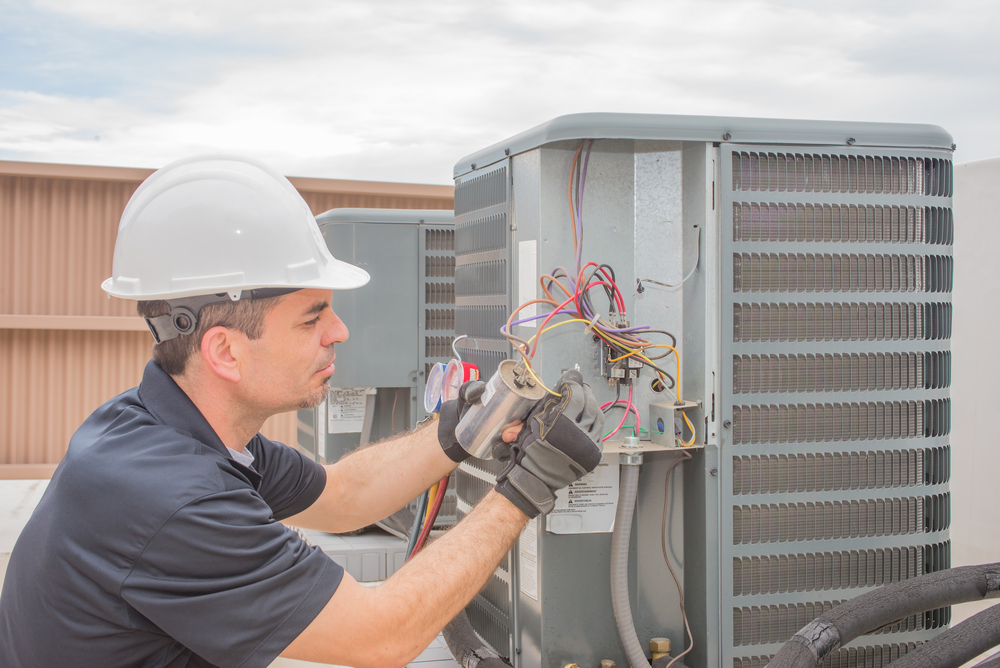
Refrigerant is a chemical compound that helps air conditioners do their job by absorbing heat from the air inside a home or business and leaving cool air behind. Knowing the different types of refrigerants used in commercial air conditioning systems can help business owners comply with refrigerant regulations and make eco-friendly choices when purchasing new HVAC equipment.
Read about some of the most common types of refrigerants used for commercial air conditioning, including details on what they’re made of and their environmental impact, in today’s blog from Omnia360 Facility Solutions.
R-12
This type of refrigerant is methane-based and is made with chlorofluorocarbons (CFCs). These are nontoxic, nonflammable chemicals that contain carbon, chlorine, and fluorine. R-12 is known to contribute to global warming and, therefore, was banned in 1994. However, if you have older HVAC equipment, it may still use R-12 refrigerant.
R-22
This type of refrigerant is also known as Freon. It’s made with CFCs, but it contains less chlorine, so it’s less harmful to the environment. Although it’s not as dangerous as R-12, it’s not considered “eco-friendly” by any means and will be phased out by 2030 due to international environmental concerns.
R-290
If you’re looking for an eco-friendly commercial air conditioning refrigerant, R-290 is a good option. It’s propane-based and flammable (which affects its ability to be shipped), but it adheres to the EPA’s SNAP (Significant New Alternatives Policy) program.
R-410A
This type of chlorine-free refrigerant is made with industrial chemicals called hydrofluorocarbons (HFCs). It’s also known as Puron. It was developed as an alternative to Freon. In comparison, Puron is more eco-friendly and also more efficient than Freon.
R-513a
This type of refrigerant is another eco-friendly option for commercial air conditioning. It’s a hydro-fluoro olefin (HFO)-based refrigerant, organic compounds made of fluorine, hydrogen, and carbon. Also known as Option XP10, R-513a is a highly efficient refrigerant option for air conditioning and is unknown to harm the earth’s ozone layer.
Need Help Choosing Refrigerant For Your Commercial Air Conditioning Needs?
Contact Omnia 360 Facility Solutions. Our licensed HVAC technicians can offer trustworthy guidance to help you make the best choice for your business. We offer customized HVAC services and packages to meet the unique needs of your business and budget, so if you’d like a quote or you want to schedule service, call us today.